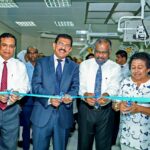THE ASSESSMENT OF THE NATIONAL HEALTH CARE SYSTEM OF SRI LANKA
The preamble:
In the year 2023, my husband suffered a seizure, and this was the start of a yearlong series of hospital visits which culminated in him passing away at the end of 2024. During his illness, my family had the opportunity to obtain the services of almost all the major private hospitals in Sri Lanka and have a brief experience with the National Hospital of Sri Lanka. During this year of hospital visits and Doctor’s appointments we had many experiences that may be common to the families of patients undergoing a serious illness. I thought it was important that I share our experiences in the hope that some of our experiences will be considered and perhaps where improvement can be made, the system changed by the powers that be.
Our experience can be divided into two parts- the private sector and the public sector.
In the private sector we found the hospital facilities and consultant Doctors we encountered extremely professional and highly skilled in their respective fields. However, the training of the ward Doctors and Nurses while acceptable, in some instances, could be hit or miss. Many of these Doctors, and Nurses were working both in the private and national hospital system. A common theme that we heard was that many of them loved working in the national hospital system due to the autonomy they had within their working environments however a major issue was hospital politics and lack of resources.
Our experience crossed over to the National Health care system in April of 2024 when following gallbladder surgery, my husband was admitted to “Ward 86” of NHSL Epilepsy building at the National Hospital of Sri Lanka (NHSL). At this ward, my husband was looked after by Dr Prabath Kumarasinghe, a consultant surgeon attached to this ward. His care of my husband was exceptional and the ward doctors, and nurses were well trained and professional. A common comment was the lack of resources available at the hospital and the difficulty in getting trained professionals to work within their units.
As the family of a patient admitted, we felt very strongly that we need to support the NHSL especially dedicated Doctors such as Dr Kumarasinghe as they were necessary to the smooth functioning of the hospital system. Following the discharge of my husband, I asked Dr Kumarasinghe, how we can help the NHSL, and he suggested the creation of a secondary theatre to support Donor Transplants, and in particular to facilitate “live donor” liver transplants among patients on the waiting list for liver transplants.
Following this request, as member of the construction industry, I initiated a charity trust to raise funds and build this theatre. The project cost was 30 million rupees and took 10 months to plan and it was built in 2 weeks using a modular system which allowed for a relative risk free and time sensitive construction. A great achievement for our construction professionals and contractors.
The inauguration of the theatre was on the 20th of February 2025, and it is now being utilized.

The picture above shows Dr Kumarasinghe at work in the new theatre with his team.
The benefit of a “live donor” liver transplant is the fact that a recipient does not have to wait to receive a deceased person’s liver but can potentially get a donation from a living family member or friend who wishes to assist the recipient. Unfortunately, “Live Donor” Transplants are yet to take place at the theatre however it is hoped that NHSL will facilitate this type of surgery soon.
A key observation that I have made during the year of husband’s illness is that the Sri Lankan Health care sector has many skilled, talented and professional Doctors and Nurses employed. My husband received excellent care in both the private and public sectors. It was a pleasant surprise to experience the level of professional care one would expect in “developed country” here in Sri Lanka and particularly at the NHSL.
A common sentiment expressed to myself and my children during my husband’s illness by well-meaning family members and friends was that we should go to Australia or Singapore to get treatment. The implication was that one cannot get good quality treatment in this country. I too felt the same prior to my husband’s illness however, having experienced the gamut of health care services required and available to my husband, it was clear that he was deprived of nothing being treated in Sri Lanka.
I think, it is important that the Government of Sri Lanka, improve the perception of National Health Care system in Sri Lanka, so that our dedicated Doctors and other health care professionals are valued by the citizens of this country.
To acknowledge the dedication and service provided by Health professionals working particularly in the public sector, brought me to be involved in the fitting out of secondary theatre at the NHSL epilepsy building. The sad reality is that many patients who require Liver Transplants go to places like India paying more than RS 20 million rupees for such surgeries, it is equally expensive for people who would seek to have this type of surgery done in the private sector.
By providing an alternative to the private sector or asking patients to go overseas for this necessary surgery, I was hoping this option will give needy patients an alternative. I am hopeful that the NHSL will provide the required additional resources, to support this initiative.
Many countries such an India and Thai land promote medical tourism in their countries, an important foreign exchange earner. Sri Lanka too can exploit its well-established Health care sector especially in areas like organs transplants such as Live Donor Liver Transplants, thereby establishing another possibility for foreign exchange.
Of course, maintaining ethical practices such as establishing a central database of organ donations & other necessary regulations is important. The provision of valuable resources to increase the capacity of the health care sector, will not only support Sri Lankan citizens but also create an opportunity to enhance the public healthcare sector to include medical tourism. It is up to the relevant authorities to ensure that the reputation of the National Health Care system is improved.
The starting point should be ensuring our health care professionals including our talented young doctors are supported and nurtured, the alternative is that many will try to work with the existing system but eventually they will give up and move to another country not because they don’t believe in the health care system but simply because they are tired of fighting a system that is not supporting them.
HON NALINDA JAYATISSA, Minister for Health and Mass Media and Dr Anil JAYSINGHE; Secretary to minister of Health and Mass media
I humbly submit to you my account of our experiences with the Health Care System in Sri Lanka and request that you commit further resources to the National Health Care system and support the dedicated healthcare professionals working in the State sector, by nurturing them and improving the resources, conditions and image of the Health Care Sector.
The National Health care System it is one of the truly important services the Government of Sri Lanka provides to its citizens. I hope in your tenure as the Minister you take note of our concerns and improve the system!
EmeritusProf. Chitra Weddikkara
BSc (BE), A. Arch. (Aus), B.App. Q.S. (Distinct.) (Aus.),
MSc. Build. (Aus.), Ph.D. Law (Aus.),
ARAIA, AAIQS, FRICS, FIA (SL), FIQS (SL)
Former Dean of the Faculty of Architecture, University of Moratuwa
Dean of Colombo School of Construction Technology, Pita Kotte, Sri J’Pura



